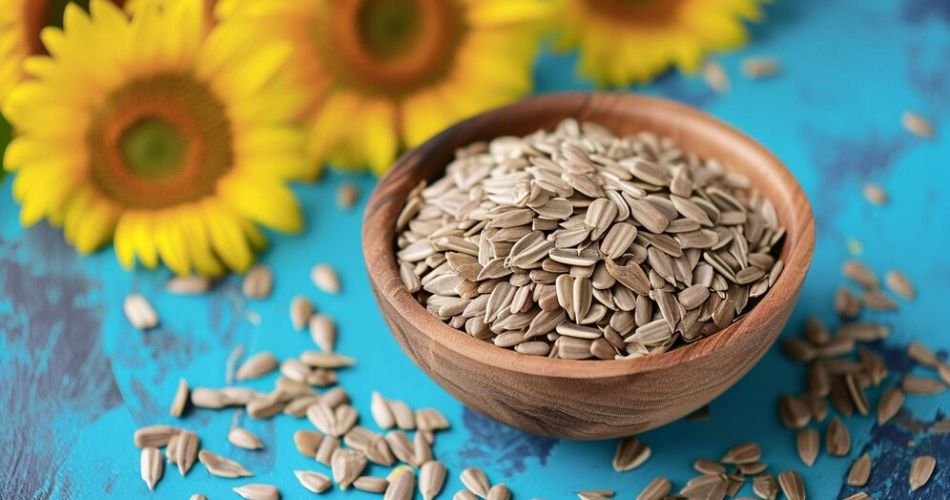Sunflower seeds nutrition is a topic gaining massive popularity among health enthusiasts and everyday snackers alike. These tiny seeds pack an impressive nutritional punch, making them a smart addition to a well-balanced diet. Whether you’re tossing them into your morning smoothie, sprinkling them over a salad, or munching on them solo, sunflower seeds are more than just a tasty snack—they’re a nutritional powerhouse. With growing awareness about natural foods and clean eating, sunflower seeds have become a go-to source for essential vitamins, healthy fats, and vital minerals that our bodies crave. In this article, we’ll break down the key nutrients in sunflower seeds and how they benefit your health in real-life terms.
A Rich Source of Healthy Fats
One of the most talked-about aspects of sunflower seeds nutrition is their fat content—but don’t worry, it’s the good kind. Sunflower seeds are rich in polyunsaturated and monounsaturated fats, especially linoleic acid, which supports heart health and helps regulate cholesterol levels. Unlike saturated fats that can clog arteries, the healthy fats in sunflower seeds help keep your cardiovascular system running smoothly. Think of them as nature’s way of oiling your internal engine, allowing your body to function efficiently while also keeping inflammation at bay.
Protein Power in Every Bite
If you’re looking to boost your protein intake without loading up on meat, sunflower seeds are a fantastic plant-based option. With approximately 6 grams of protein per ounce, sunflower seeds nutrition supports muscle repair, energy production, and overall bodily strength. The best part? They’re easy to incorporate into vegetarian or vegan diets, making them a perfect protein-rich snack on the go. Whether you’re an athlete or simply trying to stay fit, adding sunflower seeds to your diet can help meet your daily protein needs naturally.
High in Fiber for Digestive Health
Fiber is essential for a healthy digestive system, and sunflower seeds deliver a decent amount of it. Each ounce of seeds provides about 2–3 grams of dietary fiber, which helps to maintain bowel regularity, control blood sugar levels, and keep you feeling full longer. If you’re someone who struggles with snacking or overeating, the fiber in sunflower seeds can help manage your appetite and support weight control. It’s like a natural traffic controller for your digestive tract, keeping everything flowing smoothly.
Packed With Vitamin E for Skin and Immunity
Sunflower seeds nutrition includes an excellent dose of vitamin E, an antioxidant that’s great for your skin and immune system. Just a handful of these seeds can deliver more than 35% of your recommended daily intake. Vitamin E combats free radicals that damage cells and cause premature aging, while also enhancing immune defense mechanisms. So, the next time you think of a skincare routine, remember that beauty can also come from what you eat—and sunflower seeds make a skin-friendly addition to any diet.
A Treasure Trove of B Vitamins
Another reason sunflower seeds nutrition is celebrated is the presence of B-complex vitamins like thiamine, niacin, and folate. These nutrients are essential for converting food into energy, supporting brain health, and improving metabolic function. Thiamine helps nerves function smoothly, niacin boosts brain performance, and folate is particularly crucial for pregnant women. A small serving of sunflower seeds can help keep your mental clarity sharp and your energy levels high throughout the day.
Mineral-Rich and Vital for the Body
Sunflower seeds are a great source of essential minerals such as magnesium, selenium, phosphorus, and zinc. Magnesium plays a key role in over 300 biochemical reactions in the body, including muscle function and blood pressure regulation. Selenium is important for thyroid health and immune defense, while phosphorus supports bone health, and zinc boosts healing and immunity. Together, these minerals make sunflower seeds a compact and convenient mineral supplement straight from nature.
May Help Manage Blood Sugar Levels
Sunflower seeds nutrition might also help those dealing with blood sugar concerns. The seeds have a low glycemic index and their healthy fats, fiber, and protein can contribute to stabilizing blood glucose levels. Including them as a part of meals or snacks may reduce blood sugar spikes, especially in individuals with prediabetes or type 2 diabetes. When eaten in moderation, they can be a smart component of a diabetic-friendly diet plan.
Supports Heart Health
Cardiovascular health is one of the biggest reasons people look into sunflower seeds nutrition. These seeds contain compounds like phytosterols, vitamin E, and unsaturated fats that work together to protect your heart. Phytosterols compete with cholesterol for absorption in the digestive system, which can reduce bad cholesterol levels. Their potassium content also helps balance sodium levels, promoting healthy blood pressure. All these features make sunflower seeds a heart-smart choice for anyone aiming to boost cardiovascular wellness.
Good for Brain Function and Mood
Thanks to their magnesium and vitamin B6 content, sunflower seeds may help improve brain function and stabilize mood. Magnesium is known to reduce stress and anxiety, while vitamin B6 supports the production of neurotransmitters like serotonin and dopamine. These feel-good chemicals regulate mood and promote mental well-being. So if you’re feeling foggy or down, a small handful of sunflower seeds might be just the mood-boosting snack you need.
Beneficial for Bone Health
You might not associate seeds with bone strength, but sunflower seeds nutrition offers important nutrients like phosphorus, magnesium, and calcium, all of which contribute to maintaining strong bones. These minerals work in harmony to prevent conditions like osteoporosis and joint degeneration. For growing children and aging adults alike, sunflower seeds are a smart choice to keep bones sturdy and resilient.
Anti-Inflammatory Properties
Sunflower seeds contain a variety of antioxidants and plant compounds that help fight inflammation in the body. Chronic inflammation is linked to numerous diseases including arthritis, diabetes, and heart disease. The vitamin E, flavonoids, and other antioxidants in sunflower seeds act like tiny fire extinguishers, calming the inflammation and protecting your cells from damage. Adding sunflower seeds to your diet is a simple step toward long-term health and wellness.
Helps in Weight Management
Despite being calorie-dense, sunflower seeds nutrition can actually help with weight control when consumed mindfully. The protein, fiber, and healthy fats work together to keep you satiated and curb cravings. They make an ideal replacement for processed snacks and help support a balanced approach to eating. Including them in salads, yogurt, or even just as a handful during the day can reduce overeating and support your fitness goals.
A Versatile Superfood in Your Kitchen
One of the best things about sunflower seeds nutrition is how easy it is to include in daily meals. From sprinkling on oatmeal and yogurt to blending into smoothies or adding to homemade granola, the options are limitless. They can even be ground into sunflower seed butter, a great alternative to peanut butter for those with allergies. Their nutty flavor enhances both sweet and savory dishes, turning every bite into a nutritional boost.
Ideal for Vegans and Vegetarians
Sunflower seeds are a perfect fit for plant-based diets, providing nutrients that are sometimes harder to get from non-animal sources, like iron, protein, zinc, and B vitamins. They help round out a vegan or vegetarian meal plan while adding texture and flavor. Whether eaten raw, roasted, or ground, they offer a nutrient-dense solution for those looking to maintain a balanced and ethical lifestyle.
Conclusion
Sunflower seeds nutrition is more than just a buzzword—it’s a gateway to better health packed into a small, crunchy seed. From heart health and glowing skin to better digestion and stable mood, these seeds offer benefits that cater to nearly every part of the body. As long as they’re consumed in moderation and balanced with other whole foods, sunflower seeds can be a powerful ally in your wellness journey. So go ahead—add that sprinkle of sunflower seeds to your next meal and enjoy the flavorful boost to your health.




